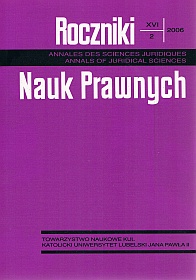The Direction of Changes in Polish Civil Law Proceedings Since 1989
Abstract
The regulations concerning civil law proceedings have been in a state of flux since the end of the 1980s. One cannot fail to notice that the basis of these transformations lies in “a return to normality”, which in this case would be an implementation of solutions that are modelled upon the classical approach of the pre-war era. It is distinctly evident in successive amendments that reinforce the disposability and inter partes principles of court proceedings and weaken the ex officio principle and the power of the judge. One may be tempted to ask whether those changes are adequate to the demands of the public, and whether there should be created a model of proceedings that would reconcile the fundamental principles of substantive civil law with the right to be tried and the right to justice realised by virtue of rules of procedure. Indisputably, reaching a fair balance of the values guaranteed by the law in inter partes civil proceedings is an extremely difficult task, nonetheless many discussions take place in numerous countries, in effect leading to improvements of the law. Following current trends worldwide, Polish legislators must construct such laws that would weigh the principle of truth (the active judge) against the principle of disposability (the judge is passive in the process of collecting evidence and establishing factual circumstances).
Copyright (c) 2006 Roczniki Nauk Prawnych

This work is licensed under a Creative Commons Attribution-NonCommercial-NoDerivatives 4.0 International License.


